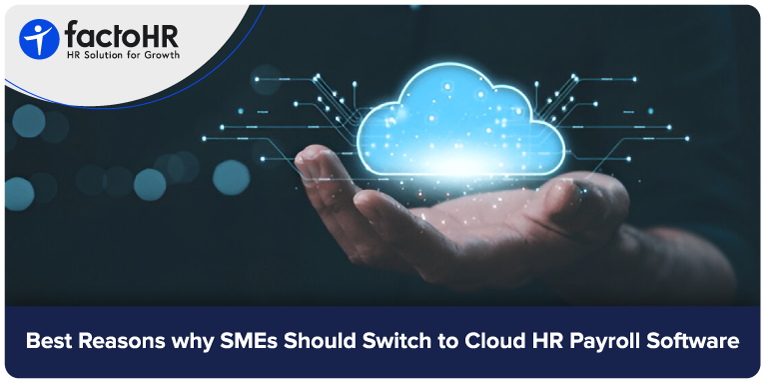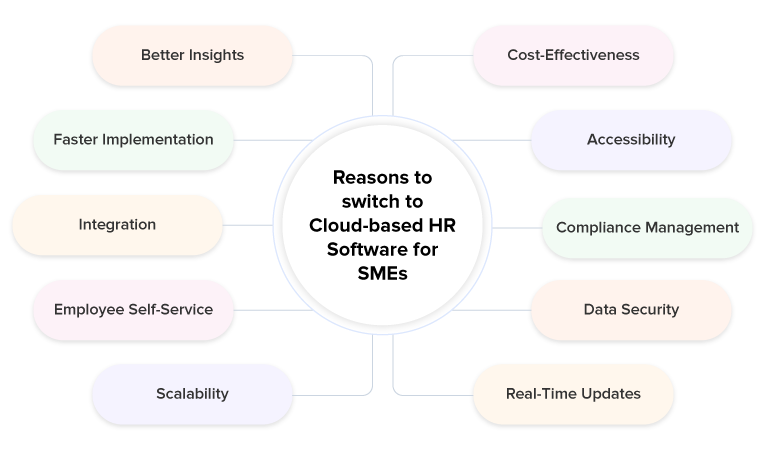10 Reasons SMEs Should Switch to Cloud HR Payroll Software

Table of Contents
Many small and medium-sized businesses believe that payroll software is only for large companies. But efficient payroll management is crucial for businesses of all sizes. Cloud-based payroll software helps SMEs streamline HR processes, reduce errors, and boost productivity. By automating payroll, SMEs can focus on driving growth, innovation, and success.
This software ensures accuracy and consistency in payroll processing, improving the employee experience and enabling better decision-making through data-driven insights. With payroll management taken care of, SMEs can stay competitive, adapt to changing market conditions, and thrive. By leveraging technology, SMEs can unlock exceptional performance across all departments and achieve their business goals.
Cloud-based payroll software is a reliable and efficient system that allows SMEs to focus on core business activities, driving innovation, growth, and economic progress. It’s a smart move for SMEs to simplify payroll and amplify growth. Here are top 10 reasons why your organization should switch to cloud HR payroll software.

10 Best Reasons to Switch to Cloud HR Payroll Software for SMEs
When you choose a comprehensive solution, it centralizes and organizes HR data, including attendance, leave policies, pay slips, and more. Thus, making it readily available to your whole staff. Organizations can alleviate the HR staff’s workload and enable them to focus on the strategic aspects of their work, rather than being bogged down by mundane tasks.
According to Forbes data, 80% of companies utilize payroll software, indicating that many small and medium-sized businesses now employ HR and payroll administration software. Here are a few advantages of cloud-based software for SMEs:

1. Cost Savings
There are several benefits of payroll software, out of which cost-effectiveness is one of them. As a startup or small firm, being frugal with your expenses becomes critical. By automating routine HR tasks, HR software reduces the workload on staff, allowing them to focus on higher-value responsibilities. By doing this, you’ll not only save time but also reduce unnecessary expenses, making things more efficient and cost-effective.
It even reduces the likelihood of errors that might result in costly legal or financial penalties. Investing in HR software for small businesses may require an upfront cost, but it’s often more cost-effective than hiring additional staff to handle routine HR tasks.
2. Remote Accessibility
Employees benefit from cloud HR and payroll software anytime, anywhere access, enabling them to handle HR tasks with greater flexibility through employee self-service. Ensure your HR system includes a mobile app that staff can use remotely at any time. Cloud HR software centralizes data, providing employees with real-time access to the information they need. Having cloud-based HR software is essential for controlling a workforce that spans multiple locations. With cloud HR, your staff have access to all the necessary company policies, HR procedures, and any other information related to the company at any moment.
3. Simplified Compliance Management
HR software helps maintain compliance with laws and regulations by automating statutory compliance, reducing the risk of non-compliance. It conveniently guides businesses through the intricate labyrinth of labor rules and regulations, which can vary depending on the region and specific needs. By minimizing compliance errors, HR software reduces the risk of legal issues and costly fines, protecting your organization from potential liabilities. Finally, as a small firm, it is critical to protect oneself, and solid human resource software may assist firms in getting compliance management.
Some HR payroll cloud software stays current with the latest laws and regulations, automatically updating to reflect changes in tax, payroll, and labor requirements, ensuring seamless compliance. Automatic compliance tools relieve your team of one of the most time-consuming administrative jobs while also assisting you in avoiding legal issues.

4. Data Security and Backup
Cloud software for small businesses helps enhance data management, particularly document control. With centralized data, you’ll have greater control over access, reducing the risk of data loss or misuse and ensuring sensitive information is only accessible to authorized personnel. You’ll also be able to be more transparent with the data because you won’t have to worry about data loss, improper access, or management. By implementing this system, SMEs can overcome significant data and security issues.
An HR software may securely store all critical data about all corporate divisions. Using simple searches, you may readily access various types of information. A corporation can analyze the performance of an individual employee by accessing his or her data. This information enables organizations to make informed decisions about promotions, demotions, and compensation adjustments.
5. Real-Time Updates and Automation
HR cloud software updates are crucial for staying compliant with the latest tax, payroll, and labor laws, thereby reducing your administrative burden and associated risks. HR software also generates all the necessary documents for conducting payroll audits. Automatic compliance with HR and payroll automation tools relieves your team of one of the most time-consuming administrative jobs while also assisting you in avoiding legal issues.
This payroll and benefits software automatically delivers all essential notifications and reminders to HR and your employees to guarantee that nothing is overlooked. This feature ensures that staff complete their tasks on time and according to schedule, saving them both time and money. Thus, this provides all users with real-time updates.
6. Scalability as Business Grows
Using HR software for small businesses allows you to optimize resource allocation. Scalable software will enable you to budget HR spending and develop your firm without limitations. With cloud-based solutions, your small business can operate flexibly from anywhere, without being tied to a specific location. You’ll be able to do business from all around the world. This kind of flexibility can also improve employee well-being and efficiency. You may utilize the skills of individuals from around the globe.
7. Enhanced Employee Self-Service
Employee self-service portals support all members of an organization, including employees, managers, HR professionals, and payroll personnel. With Employee Self-Service (ESS), employees can conveniently manage their personal and employment details, promoting autonomy and efficiency. Employees can feel more secure in handling their data appropriately without undue influence from others. ESS services also reduce the need for HR professionals to perform manual tasks, allowing them to focus on strategic HR issues.
Self-service portals enable employees to access their HR and payroll information from anywhere and at any time. Employees can use their mobile devices to view their pay history and benefits, request PTO, update their contact information, and more.
8. Integration with Other Business Tools
Integrating HR and payroll software streamlines the entire employee compensation management process by seamlessly integrating data and HR systems. It simplifies functions such as payroll calculations and payments, reducing errors, enhancing efficiency, and improving compliance. This interface facilitates the seamless transfer of employee information, including salaries, benefits, and deductions, leading to accurate and efficient payroll processing.
The HR system seamlessly integrates with a range of HR and business tools, such as time and attendance tracking, applicant tracking systems, and accounting software. Integrations can help maintain compliance with tax rules, labor laws, and other applicable requirements by automatically updating payroll settings with the most up-to-date data. For example, you can integrate HR software with Payroll software for small businesses.
9. Faster Implementation and Setup
A fast HR and payroll software deployment entails optimizing the process, prioritizing automation, and assuring data quality and compliance from the outset. Real-time mistake identification and fixing it are key features of rapid HR and payroll software implementations. This enables the system to detect and correct mistakes proactively, saving time and effort. Other key features include detailed audit trails for compliance and employee self-service platforms for faster access to pay stubs and other data.
10. Better Insights with Analytics and Reports
With HR analytics and reports from HR and payroll software, organizations can gain a deeper understanding of their workforce and payroll, enabling them to enhance their compensation, talent management, and overall human resource strategies. With these tools, companies can identify trends, predict outcomes, and improve key HR processes.
Examining historical data enables HR departments to anticipate potential issues, such as attrition or skill shortages, and take proactive measures in advance. Using analytics, it is possible to identify those who are excelling and those who could benefit from additional support, which in turn helps inform tailored training and development.

Final Thoughts
With this insight, you can appreciate the value of HR software for small businesses. Today, just embracing old methods will not help you stand apart. To stay competitive, your company needs cloud HR and payroll software that meets its specific needs. With HR software, companies can streamline their operations, boost efficiency, and position themselves for long-term success.
Adopting cloud-based payroll software for SMEs is necessary to succeed in today’s competitive landscape. It can provide numerous benefits to organizations, enabling them to gain a competitive edge over others.
If you’re looking for HR software that offers all the benefits, then consider using factoHR software. It’s a complete solution, featuring all the tools and functionalities necessary for business success and overcoming SME HR challenges. This software offers flexible customization options to tailor the package to your business requirements. Schedule a demo with factoHR today!
How do I do Payroll for My Small Business?
To do payroll for your small business, you must look to outsource payroll functions or get payroll software. Payroll software helps small businesses manage payroll by automating computations, deductions, and tax reporting, thereby saving time and reducing errors. It also assists firms in complying with tax and labor regulations by ensuring that proper tax deductions are made and filings are done promptly.
What is Saas HR Software?
SaaS HR software is a cloud-based solution offering a range of HR services, including payroll, onboarding, and benefits management, accessible via a subscription model. You can use software like factoHR, as it helps streamline your daily HR and payroll functions more effectively.
Grow your business with factoHR today
Focus on the significant decision-making tasks, transfer all your common repetitive HR tasks to factoHR and see the things falling into their place.

© 2025 Copyright factoHR


